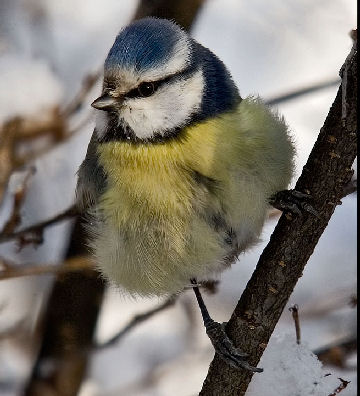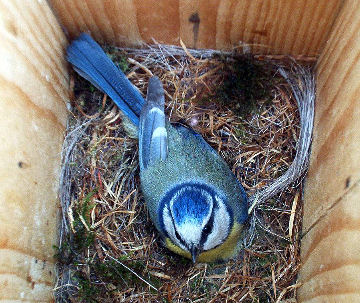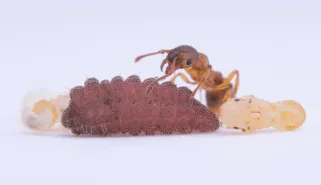Among European birds called blue tits, the early bird gets more than a worm.


Older males start singing some 5 or 6 minutes earlier in the dawn chorus and attract more of the promiscuous females than younger males do, researchers report in the September issue of Animal Behaviour.
In Europe, the springtime dawn chorus includes the voices of male blue tits (Cyanistes caeruleus), colorful little cousins of chickadees. Those males aren’t advertising for females to share a nest, though, explains Bart Kempenaers of the Max Planck Institute for Ornithology in Starnberg, Germany. They already have nest partners but seem to compete for the attention of wandering females.
Females that venture away from their chick-raising partners to mate with other males typically do so at dawn. Up to 60 percent of blue tit nests in some areas hold young fathered by a male other than the one that’s doing the feeding. What interests Kempenaers and his colleagues is what females make of the males’ early morning music.
The research team made audio recordings of the dawn performances by 61 male blue tits in Austria. The only age-related difference in serenades was that older males started to sing earlier than first-year males did, the researchers found. The birds typically live just about 2 years.
Kempenaers speculates that as the birds grow older they may get more efficient in all their activities and therefore have the energy to start singing earlier.
The team did paternity tests on the 10-plus offspring in each nest. Using this information, the researchers linked early singing with siring chicks that end up in other males’ nests. One male fathered more chicks outside his own nest than in it. More common, though, were males that had sired one away-from-home chick.
The finding “mirrors what happens in chickadees, and so that is neat,” says Ken Otter of the University of Northern British Columbia in Prince George. He’s studied chickadees, one of several other species in which the dawn chorus is being analyzed. He and his colleagues have found that high-ranking chickadees start singing earlier and sing longer at dawn than do subordinate birds. He hasn’t tested a direct link between song start and paternity, but he and his colleagues have reported that those dominant males attract more of the straying females than subordinate birds do (SN: 7/11/98, p. 27).
Otter notes that the work so far in both chickadees and blue tits supports a model proposed during the 1990s, in which males that are strong and particularly adept at hunting for food will have the energy to start singing early in the morning. If females pay attention to the dawn chorus, males should, in theory, start singing as early and as prolifically as they can.
The dawn chorus may have several functions, including a macho territorial display that discourages incursions by other males. However, Kempenaers proposes that the early singing might be one way for females to recognize desirable, older males.






